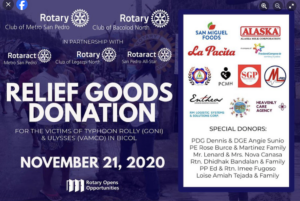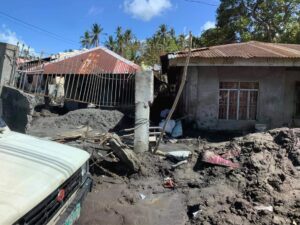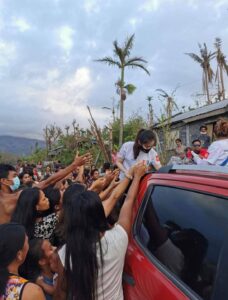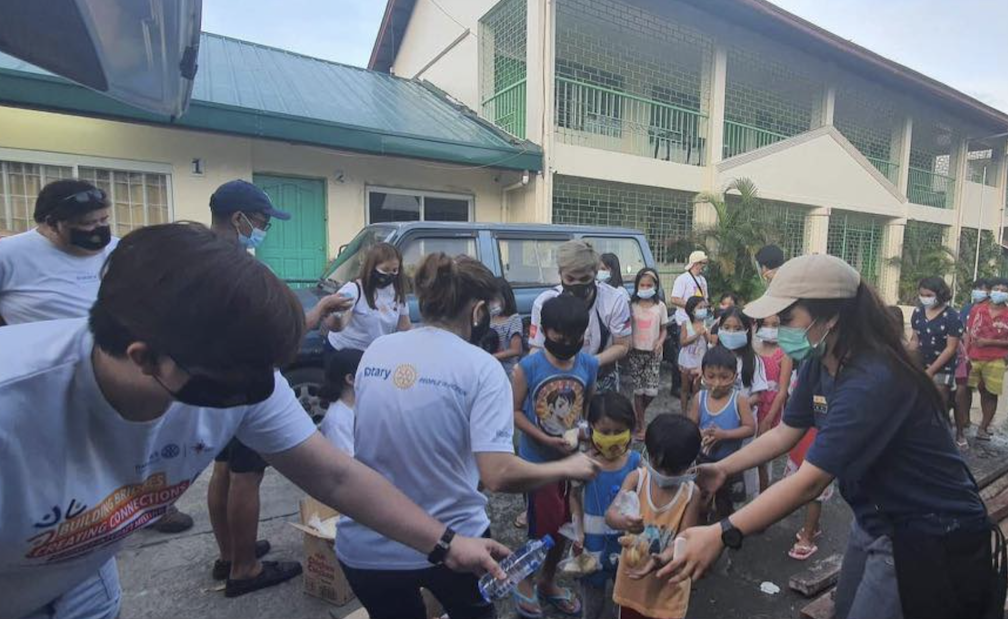by Francis Abner Abanilla, RC Metro San Pedro, D3820.
On Nov. 1 2020, in the middle of the Covid pandemic, Typhoon Goni made landfall as a Category 5 cyclone in the Bicol region, south of where I live. With speeds of 140-150 mph, it devastated many towns. Magnifying the damage, tons of mud flowed down the slopes of the Mayon Volcano, which stood in the path of the storm. A lot of provinces in the region lost electricity. On the other side of the volcano, houses were buried by mud and lahar that flowed down the slopes of the volcano for miles!
Our club teamed up with the youth clubs that we sponsored – the Rotaract Club of Metro San Pedro, Rotaract Club of San Pedro All Star, and the Interact Club of San Lorenzo School – and started calling for donations to help the people in Bicol. Barely a week later, Typhoon Vamco entered the country, bringing torrential rains which flooded the same region up to Laguna, where I live. The flooding was so dire that hundreds of families had to be evacuated.

Relief goods donation for the victims of Typhoon Rolly (Goni) and Ulysses (Vamco) in Bicol.
Before we could bring the relief donations to over 500 families in the Bicol region, we first had to help about 600 families in our hometown who were temporarily living in cramped shelters. We were only able to have the chance to bring the relief goods to Bicol in the 3rd week of November.
Before the month of November ended, we were mobilizing again, trying to help the town of Rodriguez east of Manila, which was inundated by floodwaters from a river that overflowed due to heavy rains. And would you believe, by December we were again gathering relief goods to be sent north of Manila to the province of Cagayan which was also inundated by floodwaters from a dam that had to release water because it was in danger of overflowing due to the effect of the same typhoon Vamco! This was the worst flooding in Cayagan in 40 years. Cayagan Governor Manuel Mamba cited environmental neglect and abuse as a prime factor in the catastrophic flooding, and called for a wholistic strategy.

Typhoon damage in Bicol.
I guess you can imagine the mental stress that we had to endure during that period when the whole world was locked in their homes, afraid of catching Covid. In the middle of this fear, thousands of people in our country were losing lives, homes, and property from a series of weather phenomena intensified by the effects of global warming. I, myself, quietly kept on asking the Lord why do we – a developing country of 100 million people – have to endure this suffering when our government doesn’t even have enough resources to raise the standards of living and consistently provide sufficient social and health benefits to its own people.
We just could not just sit back and protect ourselves from the virus. We had to do something to help our own people even if we didn’t have enough resources available. Environmental catastrophes bring more than physical injuries and property damage: they also affect the mental well-being both of people who are directly affected and of observers! That is why Rotarians also organized a Psychotherapy and Psychological First Aid seminar and counseling to help the victims cope with the mental stress, fatigue, depression, and trauma that they were experiencing during that awful time.
For us, the experience was also fatiguing, physically and mentally. Travelling over ten hours by land to a region where several places were still without electricity, worried that we could contract the virus anytime while we were distributing relief goods to several evacuation centers all the way to a small community atop a hill that had never received any relief for weeks, we were also worried about our own families, who could be adversely affected in case we got infected by Covid in a place where hospitals were already full, some without electricity. Covid vaccines were still not available during that period.

Relief efforts in Bicol.
During that period, the only way our youth groups could help was by calling for donations. They had to remain at home as the general rule for minors during the pandemic period here in the Philippines. We adults had to do the gathering, collecting, packing, and distributing donations and relief goods throughout the month of November 2020. We broke health and safety protocol by physically getting in contact with over a thousand people, yet we never got infected with colds, cough, flu, or Covid! That miracle could not be possible without Divine Intervention. Thank God we were able to overcome the depression and fear that hovered around us during that dark period.
It is fortunate for us this 2023-2024 year that we have not yet encountered any environmental catastrophe that will definitely affect the mental well-being of people who would have borne its effects. But there are areas in other parts of the world who are suffering disasters, and they will definitely need more than prayers to overcome the trauma and develop resiliency.
Rotarian Francis Abner Abanilla is the Director of the San Lorenzo School, San Pedro, Laguna Province, PI. He wrote an article for ESRAG last year about his students’ leadership in raising community awareness and contributing to habitat restoration. The participants in the district’s 2023 RYLA conference wrote a resounding call to action they call Ecolution.

